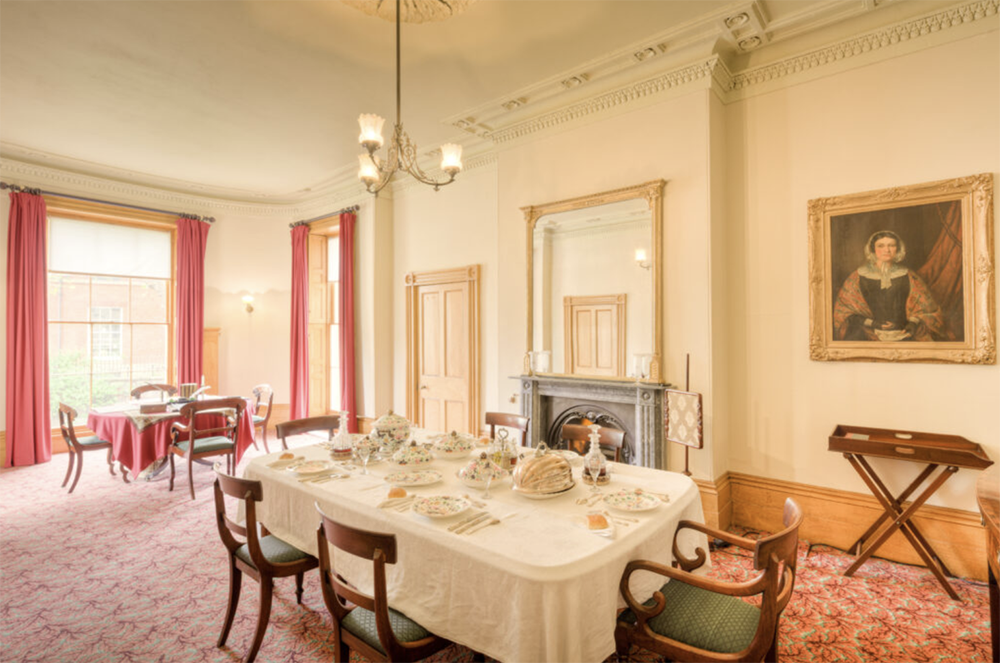The Review’s Review: Wives and Daughters; Love and Light

Elizabeth Gaskell’s House in Manchester, Greater Manchester, England, UK. Photo by Michael D Beckwith, with permission of the administration.
Agnès Varda’s 1967 Uncle Yanco is the earliest—and, at under twenty minutes long, the shortest—of her “California films.” Through greetings, dinners, interviews, and house tours, which she stages and reenacts for the camera as they occur in real time, the short documents the director’s first encounter with a distant relative, the painter Jean Varda, whose nickname titles the project. Jean lives on a houseboat in the endlessly quirky “aquatic suburbia” of Sausalito, where he paints, sails, naps, muses on love and light, receives his mail in the mouth of a jack-o’-lantern, and hosts a community of young, suntanned, bamboo-flute-playing hippies. The film is just as concerned with place as it is with person, and what makes Jean Varda’s home more stunning and fantastical than any movie set is that it actually exists, or existed.
Though its sensibility is so distinctly American, each time I return to Uncle Yanco, it gets harder to imagine the world it presents as part of today’s United States (Sausalito is in the outer reaches of San Francisco). Seen today, the film’s most striking feature might be its testament to the possibility of Jean Varda’s way of life: the radical embrace of joy and color that defines his every movement and word. “Hell is doing what you don’t like to do,” he tells Agnès, “and everything but ecstasy is vanity.” Part of me wants to cut through what can feel like Jean’s naivete to point him to the doom my reality seems daily to confront. Another part can’t help but wonder and hope that somewhere, there remains the potential for an existence like Uncle Yanco’s. And for rousing that part within me, again and again, I owe both Vardas a debt. —Owen Park
I was laid very low earlier this week by a case of strep, and to comfort me while I attempted pathetic little sips of water, I turned on the BBC miniseries Wives and Daughters, based on the 1866 Elizabeth Gaskell novel of the same name. Misunderstandings, love triangles, small-town gossip, an entomologist who sends an empty wasp nest to his beloved, and a headstrong heroine of virtue and self-possession who wasn’t done up in twenty-first-century girl-boss tackiness. I’m now feeling much better, and about halfway through North & South, another masterful Gaskell-based BBC series of nuance and superb acting—and, in this one, the class tensions marking life in a newly industrial northern England. —Lauren Kane
More historical fiction: Jaimy Gordon’s Circumspections from an Equestrian Statue is a whimsical period piece set in Providence, Rhode Island. Gordon affects a charming “olden” style that’s tongue-in-cheek but still quite delicate, although the plot’s narrative punchline—beautiful dumb society wife is molested by world’s first gynecologist unbeknownst to cuck husband—is brash in a Belle Époque–era, sex-farce way. It’s about the advent of scientific/mechanical reproduction in more ways than one: during a relaxed evening of proto-TV-watching, a parlor room audience is shown a series of image slides on a projector device, a nice intertextual foreshadowing moment to that media-brainwashing scene in The Parallax View. The way Gordon intercuts the diegesis of this scene with descriptions of the slides themselves also makes the text almost multimedia, which is very cool to do to a costume drama. And the novella is tiny, almost a vignette—more books should be this short. —Olivia Kan-Sperling
I am not exactly a person drawn to numbers and exacts—irrationality and the arts are much more my speed, and I definitely believe in ghosts—but luckily, I have the writing of Meghan O’Gieblyn to elegantly walk me through some of the most pertinent contemporary debates concerning consciousness, AI, and technology’s role in our lives. Her latest book, God, Human, Animal, Machine, is a thought-provoking look at the question of belief. Drawing on quantum physics, transhumanism, robotics, the eternal mind-body problem, and O’Gieblyn’s own experiences growing up as an evangelical Christian, this is a book that explores what we do—and absolutely do not—know about that rather old-fashioned concept of the soul. —Rhian Sasseen
Copyright
© The Paris Review
